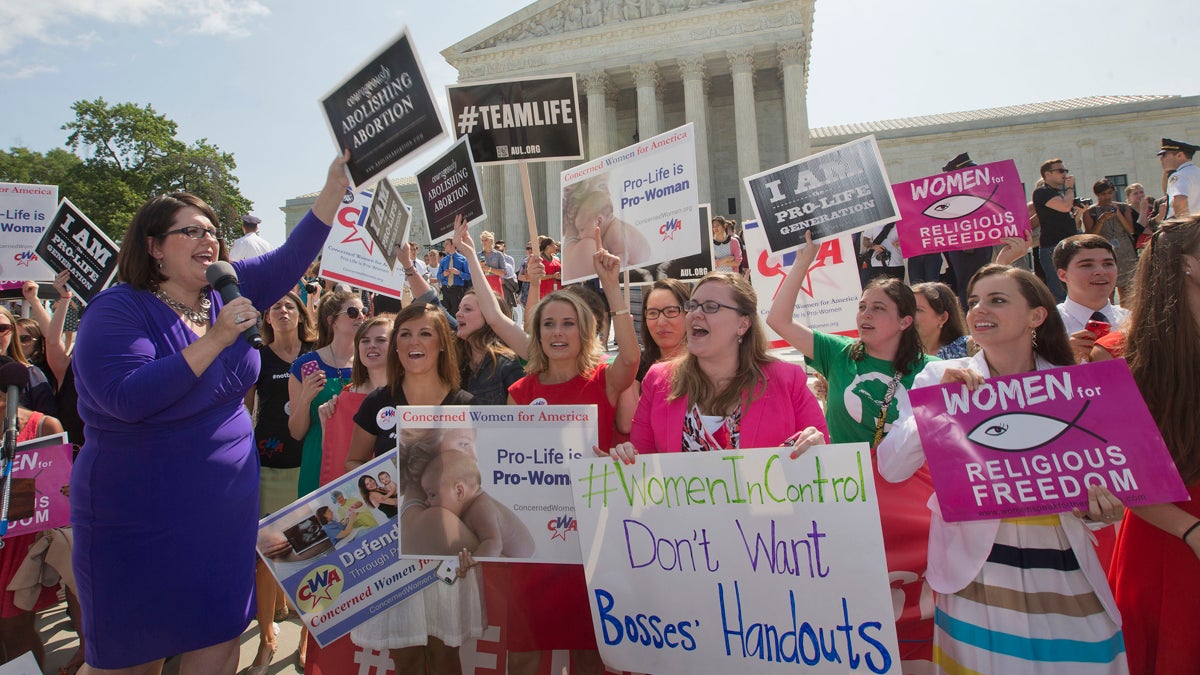The Hobby Lobby decision is not a ‘war on women’

Kristin Hughs, left, is shown announcing to supporters the Supreme Court's decision on the Hobby Lobby case in Washington, on Monday, June 30, 2014. (AP Photo/Pablo Martinez Monsivais)
With Senator Bob Casey supporting a bill to overturn the Supreme Court’s June 30 Hobby Lobby decision, new cries of a “War on Women” fill the air. But are they true? Let’s look at history.
In the 1980s, after graduate school, I got a job at Bryn Mawr College. I was a middle class, Italian Catholic kid from Long Island, New York. Bryn Mawr was a world away, with its aura of old money, privilege and ivy-bedecked buildings. As one of the renowned Seven Sisters, it was also one of the most elite women’s colleges in the country.
A woman’s college — that was a dream come true. My mother couldn’t go to college because she had to help put her brother through medical school. She wanted more for me. So, to fulfill that dream, and then work for a college dedicated to women — it was perfect.
Bryn Mawr provided its employees with good benefits. But paying for my birth control wasn’t one of them. Was Bryn Mawr College engaging in a “war on women?” I don’t think so.
And neither is the U.S. Supreme Court.
Despite the heated rhetoric, the narrowly written, 5-4 decision handed down by the Roberts Court will not take away a woman’s right to birth control. The only change from the Health and Human Services mandate is that women employed by closely held family corporations governed by explicit religious beliefs may be required to pay for certain birth control, such as the “morning-after pill.” Many doctors say this pill works not by preventing conception, but by blocking the implantation of a fertilized egg. Since Hobby Lobby believes that life begins at the egg’s fertilization, they equate emergency contraception to abortion.
Though many American companies are closely held, few are religious. For example, Mars — the world’s leading candy maker — is huge and closely held. But it’s not religious. And the courts will not let it pretend to be.
Truth is, before Obamacare, 85 percent of America’s large companies were already providing birth control to employees. Under Obamacare, businesses with fewer than 50 employees remain exempt.
This is hardly a return to the Dark Ages. It’s actually a return to 2012, prior to the passage of the Affordable Care Act. Not a single woman in any of the affected companies will lose coverage, because they have already accepted employment under these terms. But if any of them wants emergency contraception, it costs about $45 at most pharmacies. A month of oral contraception costs only $40-$80. Planned Parenthood provides all of this for even less.
Is this a “war on women?” Let’s take a look at the rest of the world.
While Hillary Clinton disagreed with the Supreme Court’s ruling, America’s most widely traveled secretary of state also remarked that “in some countries, girls don’t even get birth certificates, because they have no value.” This country isn’t one of them.
This isn’t China, either. Ever wonder why those all beautiful babies adopted from China are girls? That’s because Chinese families know that sons, not daughters, put food on the table. With China’s One Child Policy, girls are expendable.
This isn’t Pakistan, where Malala Yousafzai, at age 15, took a bullet to the brain because the Taliban opposed her advocacy for girls’ education. A Nobel Peace Prize nominee, she will receive Philadelphia’s Liberty Medal this fall.
And this isn’t Nigeria, where Boko Haram kidnapped over 300 girls to prevent them from going to school. Instead, they face brutal lives as “child brides.”
These stories show us what a real “war on women” looks like.
The Roberts Court has declared that privately held corporations whose clearly stated religious beliefs are part of their operating principles — not places like Walmart or Comcast — cannot be forced to provide employees with products or services that violate these beliefs.
This will not, as some critics fear, lead to hiring discrimination. If anything, these companies could lose out on some outstanding employees if they are women who want free birth control.
It’s also hard to imagine that many women will be hurt by this ruling. Will someone who believes there is a “war on women” want to work for a company like Hobby Lobby, which sells wall plaques proclaiming “As for me and my house, we will serve the Lord”? Will this year’s crop of Bryn Mawr College graduates flock to Lancaster County to seek their fortunes working for a Mennonite cabinet maker? Probably not.
America guarantees more rights to women (and men) than any other country on earth. We have three female U.S. Supreme Court justices and 90 women in Congress. Our next president may well be a woman. This country isn’t perfect. But if we’re really concerned about women’s rights, let’s promote them in the rest of the world, where women can only dream of the power and privileges of their American sisters.
WHYY is your source for fact-based, in-depth journalism and information. As a nonprofit organization, we rely on financial support from readers like you. Please give today.

